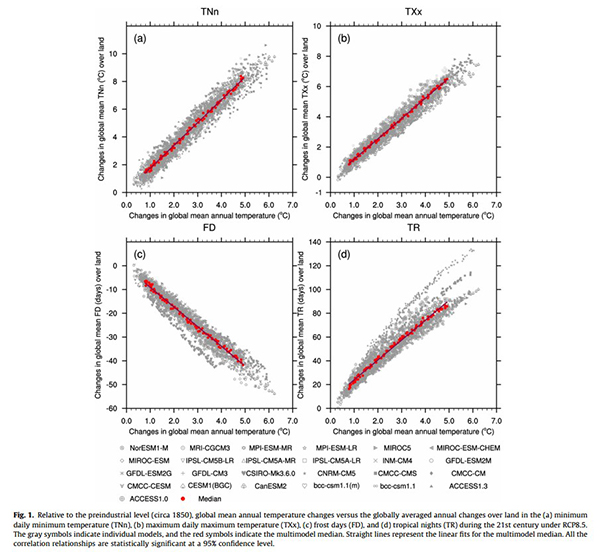最新科研进展
Future extreme climate changes linked to global warming intensity
Authors:
Xiaoxin Wang1,5, Dabang Jiang1-5, and Xianmei Lang1,2,3
1 Institute of Atmospheric Physics, Chinese Academy of Sciences, Beijing 100029, China
2 CAS Center for Excellence in Tibetan Plateau Earth Sciences, Beijing 100101, China
3 Collaborative Innovation Center on Forecast and Evaluation of Meteorological Disasters, Nanjing University of Information Science & Technology, Nanjing 210044, China
4 Joint Laboratory for Climate and Environmental Change at Chengdu University of Information Technology, Chengdu 610225, China
5 University of Chinese Academy of Sciences, Beijing 100049, China
Abstract:
Based on the Coupled Model Intercomparison Project Phase 5 (CMIP5) daily dataset, we investigate changes of the terrestrial extreme climates given that the global mean temperature increases persistently under the Representative Concentration Pathways 8.5 (RCP8.5) scenario. Compared to preindustrial conditions, more statistically significant extreme temperatures, precipitations, and dry spells are expected in the 21st century. Cold extremes decrease and warm extremes increase in a warmer world, and cold extremes tend to be more sensitive to global warming than the warm ones. When the global mean temperature increases, cold nights, cold days, and warm nights all display nonlinear relationships with it, such as the weakening of the link projected after 3°C global warming, while the other indices generally exhibit differently, with linear relationships. Additionally, the relative changes in the indices related to extreme precipitation show significantly consistent linear changes with the global warming magnitude. Compared with the precipitation extremes, changes in temperature extremes are more strongly related to the global mean temperature changes. For the projection of the extreme precipitation changes, models show higher uncertainty than that in extreme temperature changes, and the uncertainty for the precipitation extremes becomes more remarkable when the global warming exceeds 5°C.
Key words:
Projection, Global warming, Climate extremes, Linkage, Uncertainty

Citation:
Wang, X., D. Jiang, and X. Lang, Future extreme climate changes linked to global warming intensity, Science Bulletin, 2017, https://doi.org/10.1016/j.scib.2017.11.004, 在线发表
